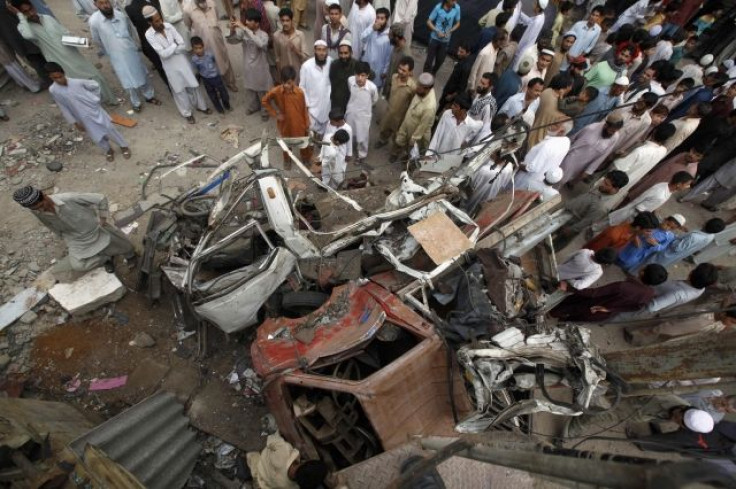High Noon In Pakistan: Karachi’s Privileged Few Taking Extraordinary Measures Against Wave Of Ceaseless Violence

The wealthy elite of Karachi, Pakistan -- one of the most violent and dangerous cities on earth -- have responded to a renewed wave of killings and kidnappings by taking some extraordinary and expensive security measures: They are making their luxury automobiles bullet-proof and bomb-proof.
Karachi, a teeming metropolis of some 18-million people on the Arabian sea, is a textbook case of everything that is wrong with Pakistan -- massive wealth next to appalling poverty; a corrupt political establishment; endless sectarian violence; drug gangs and overmatched and incompetent police.
Nadeem Khan, a successful businessman who owns pharmaceutical labs and marble workshops, told the Agence France Presse news agency that he feels endangered and has no faith in the police to protect him.
“Karachi is more dangerous than Kabul,” he said. “We have police here and we have Rangers [paramilitary forces] here but they won't lay a hand on the criminals. So the people are compelled to have themselves secured by having their own personal bodyguards and armored vehicles.”
Khan himself has installed armor on two of his vehicles and plans to do the same for his father and brother. “I got threats many times,” he told the AFP. “I am the head of the law and order committee of the Korangi Industrial Area, and there are so many dacoits [bandits] and robbers there,” he added “There are bhatta [extortion] groups -- they always hurl threats on the phone.”
According to the Human Rights Commission of Pakistan, 1,726 people in Karachi were killed by violence in the first half of this year, a spike from the 1,215 recorded in the first six months of 2012. In addition, more than 100 people in the city were kidnapped last year, according to the Citizens-Police Liaison Committee.
With no signs of the violence abating anytime soon, Karachi’s top 1 percent are stocking up on security measures, thereby creating a boom for companies like Streit, which provides armor for automobiles. Khalid Yousaf, the boss of Streit Pakistan, said his business has doubled since December.
But such precautions do not come cheaply -- providing anti-attack features to a car can cost anywhere from $30,000 and $45,000 -- in an impoverished country where the average per capita income is only about $1,250. “We were expecting at the beginning to armor three to four cars per month, but initially in the first months and onward we had seven cars, then 10,” Yousaf told the AFP. “Now we [have] around 15 cars per month. Maybe it is going to increase even more.”
An unidentified salesman also confirmed that such orders were rising as Karachi residents increasingly fear for their safety. “Before, we were watching movies where in Mexico or South America people were roaming in armored vehicles,” he told the AFP. “We were amazed to know why they were doing this, but now it is happening here in Pakistan -- rich and famous people are asking for their safety and are moving around in armored vehicles.”
Nonetheless, such measures do not necessarily guarantee protection for Karachi’s high and mighty. In July, Bilal Shaikh, the chief of security for former President Asif Ali Zardari, was attacked in his armored vehicle and killed instantly by a suicide bomber.
For Karachi’s less well-heeled citizens, the violence and bloodshed continues unabated. Dawn, a Pakistani English language newspaper, reported that four people were killed across the city on Wednesday, including one man in the aforementioned Korangi Industrial Area.
Hamna Zubair, a Karachi native who now lives in New York, described the climate of fear in her hometown in a blog. “[We in Karachi] have lived with intense ethnic strife, terrorism, protection rackets and violent street crime for over two decades,” she wrote. “When Karachi suffered its first few bouts of ethnic violence in the 1990s, people were genuinely afraid. They organized neighborhood watches, stayed indoors and kept their children home from school. But as the years passed and different governments came and went without managing to establish peace in the city, Karachi's residents became hardened. Those who thought they could profit from violence were swallowed up by whichever gang, extremist organization or political party was in vogue. Those who didn't want to profit from violence found a way to live with it. I was lucky enough to be raised in a home surrounded by four strong walls and a lockable gate, a privilege most of the city's residents don't have. But I can still describe what getting used to living with fear feels, tastes and smells like.”
© Copyright IBTimes 2024. All rights reserved.











